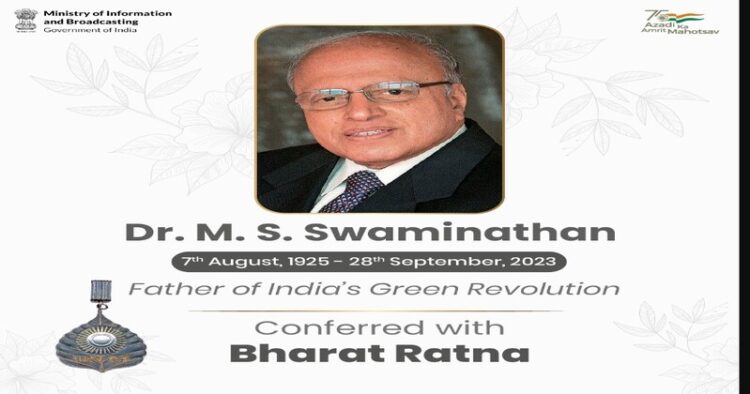In a fitting tribute to his lifelong dedication to revolutionising agriculture and championing the cause of farmers, the late agricultural scientist MS Swaminathan has been posthumously conferred with the prestigious Bharat Ratna, India’s highest civilian award.
Prime Minister Narendra Modi announced the honour on Friday, February 9, recognising Swaminathan’s monumental contributions to the nation in the field of agriculture and farmers’ welfare. Fondly hailed as the “Father of the Green Revolution,” Swaminathan’s pioneering research and tireless efforts have left an indelible mark on India’s agricultural landscape.
Born on August 7, 1925, in Kumbakonam, Tamil Nadu, to Dr M K Sambasivan and Parvati Thangammai, Swaminathan embarked on his journey to transform India’s agriculture sector at a time when traditional farming methods prevailed.
After completing his PhD in Genetics from Cambridge University in 1952, Swaminathan joined the Central Rice Research Institute (CRRI) in Cuttack, where he played a pivotal role in developing fertiliser-responsive varieties of rice, heralding the onset of the Green Revolution in India. His research laid the foundation for high-yielding wheat and rice varieties, ensuring food security and transforming India into a foodgrain surplus nation.
Swaminathan’s commitment to improving agricultural practices extended beyond research laboratories. He actively engaged with farmers, working alongside them to implement innovative farming techniques and enhance crop yields. His advocacy for sustainable agricultural practices and rural development led to the establishment of the M S Swaminathan Research Foundation (MSSRF) in 1988, dedicated to leveraging modern science for agricultural and rural development.
Throughout his illustrious career, Swaminathan held numerous official positions, including Chairman of the National Commission on Farmers and President of the Pugwash Conferences on Science and World Affairs. He served as Director of the Indian Agricultural Research Institute and Director General of the Indian Council of Agricultural Research, leaving an indelible mark on agricultural policy and research in India.
Swaminathan’s contributions were not confined to the national stage; he was a respected figure in the global agricultural community. His efforts were recognised with numerous accolades, including the World Food Prize, which he received for his role in introducing high-yielding crop varieties in India during the 1960s.
Despite his international acclaim, Swaminathan remained deeply rooted in his interactions with farmers, always mindful of their needs and aspirations. His daughter, Dr Soumya Swaminathan, reflects on his enduring legacy, recalling how farmers across India expressed their gratitude whenever they met him.
Swaminathan’s passing on September 28, 2023, marked the end of an era in Indian agriculture. However, his legacy continues to inspire generations of farmers and agricultural scientists, ensuring that his vision for a prosperous and sustainable farming community lives on.



















Comments